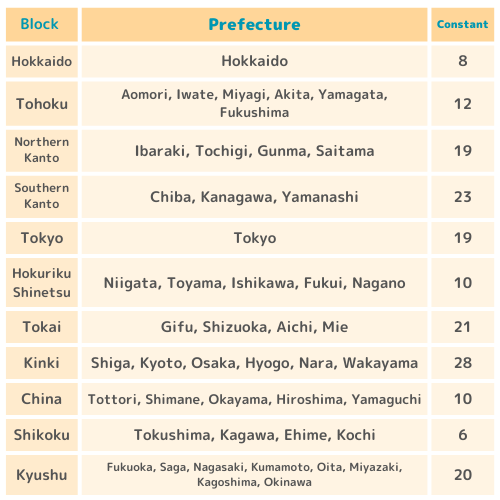Next, let's look at the characteristics of each election.
General Election Of Members Of The Lower House Of Parliament
A general election is an election held to elect all members of the House of Representatives, with the primary election and proportional representation election held on the same voting day.
-
Due to the expiration of the term of office of members of the House of Representatives (4 years)
Dissolution of the House of Representatives to be carried out by the dissolution of the House of Representatives
There are two types of them
The number of members is 465 (289...constituency elected members, 176...proportional representation elected members).
The following table shows the electoral districts for the House of Representatives proportional representation election and the number of seats available by each electoral district.

(Diagram created by a member)
*As a general rule, the redistricting of constituencies is reviewed every 10 years, based on the population as determined by the census!
House of Councillors regular election
A regular election for the House of Councillors is the election of half of the members of the House of Councillors. We will also look at the characteristics of the House of Councillors.
- No dissolution, always active until the end of the term (6 years)
- Quota: 248 (100...elected by proportional representation, 148...elected by constituency)
The Constitution of Japan stipulates that half of the members of the House of Councillors are replaced every three years. Therefore, it is necessary to elect one half of the quorum every three years.
*Tottori, Shimane, Tokushima, and Kochi are in the combined district.
General elections (local elections)
In general elections (local elections), all members of prefectural and municipal (local government) assemblies are elected.This election will take place at
-
Term expiration (4 years)
When all members or elected members are gone due to dissolution of the council, etc.
There are also different types of local elections.
・Election of the head of a local public entity
①Term expiration (4 years)
②Dismissal by direct request (recall) of residents
③Lost office due to vote of no confidence
④Death
⑤retirement
⑥Loss of office due to forfeiture of the right to be elected

・Installation Election
Special Elections (National and local)
In addition to the above, there are other elections held in special cases, both national and local.
・Redistricting (redoing elections or making up for lack of winners)
①When even one person falls short
②when a certain number is reached
・Substitute election (to fill a deficiency in the number of council members)
*The difference with re-election…is whether the person is already a legislator or not.However, even if you are already a council member, if your election or the election itself is invalidated due to election violations, etc., you will be re-elected.
*In the case of national elections, as a rule, supplementary elections are held twice a year, on the fourth Sunday of April and October.
・Election of more members (increase the number of councilors)
*Re-election, alternate election, or election to increase the number of members of the local public entity's council shall not be held if the reason for holding such election occurs within six months of the end of the term of office,
except when the number of council members no longer reaches two-thirds of the capacity of the council.